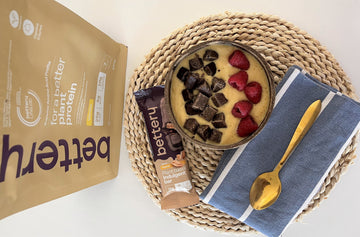
Os polifenóis (moléculas compostas por múltiplos anéis fenólicos - hidroxibenzenos), são compostos que não estão diretamente envolvidos no desenvolvimento ou na reprodução das plantas, mas que atuam ao nível da radiação UV, microrganismos patogénicos e oxidação (1). Podemos encontrá-los na fruta, hortícolas, e outros produtos alimentares (vinho tinto, chocolate negro, chá etc.)., onde possuem uma potente ação anti-inflamatória, encontrando-se a sua ingestão relacionada com um menor risco de doenças crónicas (2). Alguns exemplos de polifenóis são os ácidos fenólicos, flavonóides, estilbenos, lignanos, isoflavonas, flavonas, antocianidinas, flavonóis e flavanonas (3).
Os estudos científicos têm demonstrado que, ao contrário de elevadas doses crónicas de vitamina C e E (4, 5), a ação antioxidante de fontes naturais de polifenóis pode melhorar o desempenho desportivo (6). Esta melhoria do desempenho, parece relacionada com o aumento da biogénese mitocondrial e resposta antioxidante (estímulo do NrF2, SIRT1 e PGC-1α) e da função endotelial (aumento da eNOS com diminuição da NADPH oxidase) (7). Note-se que o aumento do fator nuclear Nrf2 é de extrema importância, já que este aumenta a expressão de enzimas antioxidantes que são ~1000 vezes mais potentes que outros antioxidantes padrão, como a vitamina C ou a vitamina E (8). Outro fator de transcrição importante refere-se à adenosina monofosfato cinase. A AMP cinase é um regulador muito importante do metabolismo, promovendo a mitofagia (remoção de mitocôndrias danificadas) e a biogénese (génese de novas mitocôndrias) (8). Pela necessidade constante de ATP, a nível celular, é extremamente importante manter a eficiência deste enzima. Como já foi anteriormente referido, os polifenóis podem também promover a vasodilatação, alegadamente por estimularem a conversão dos nitratos dietéticos em óxido nítrico (NO) (9, 10). Quanto maior for o número de grupos hidroxilo no polifenol, mais eficiente será a conversão dos nitratos dietéticos em óxido nítrico (10, 11).
Uma revisão recente de Bowtell & Kelly, conclui que a ingestão de ~300 mg de polifenóis, na hora anterior ao exercício, aumenta o endurance e a capacidade de efetuar sprints repetidos, muito provavelmente devido a um aumento da perfusão muscular (11). Estes efeitos já haviam sido previamente descritos por uma excelente meta-análise de Sommerville et al. (7). Com base no atual corpo da evidência científica, uma dieta equilibrada com alimentos ricos em antioxidantes (fruta, chá etc.), poderá ser uma melhor estratégia em detrimento da utilização de elevadas doses de antioxidantes sintéticos (8). De forma resumida os polifenóis podem modular o stress oxidativo (12), melhorar a função imunológica (13), microbioma (14), performance cognitivo e humor (15). Adicionalmente uma recente meta-análise por Ammar et al., sugeriu uma ação neuroprotetora dos polifenóis em adultos saudáveis (16).
Alguns trabalhos têm proposto também os polifenóis e as catequinas do chá verde, como uma das explicações plausíveis para o seu efeito ergogénico (17), mesmo perante a ingestão de chá verde descafeinado (18). Apesar da maioria da evidência apontar para uma melhoria no desempenho físico, recuperação ou parâmetros metabólicos (18-21), note-se que a evidência não é consensual nesta matéria (22, 23). Apesar de haver ainda muito para investigar, no que diz respeito aos polifenóis e performance, a evidência parece promissora nesta matéria. Tendo em conta os efeitos ergogénicos aqui discutidos com os polifenóis, o nosso produto energy utiliza extrato de chá verde com elevada concentração de polifenóis (40%), de forma que os nossos clientes possam beneficiar não apenas do efeito ergogénico dos polifenóis, mas também dos seus pretensos benefícios na saúde (24-33). Contamos muito em breve ter dados científicos em relação ao produto energy para partilhar convosco. Estejam atentos!
Bibliografia
-
Pandey KB, Rizvi SI. Plant polyphenols as dietary antioxidants in human health and disease. Oxid Med Cell Longev. 2009;2(5):270-8.
-
Del Bo C, Bernardi S, Marino M, Porrini M, Tucci M, Guglielmetti S, et al. Systematic Review on Polyphenol Intake and Health Outcomes: Is there Sufficient Evidence to Define a Health-Promoting Polyphenol-Rich Dietary Pattern? Nutrients. 2019;11(6).
-
Losada-Echeberría M, Herranz-López M, Micol V, Barrajón-Catalán E. Polyphenols as Promising Drugs against Main Breast Cancer Signatures. Antioxidants (Basel). 2017;6(4).
-
Gomez-Cabrera M-C, Domenech E, Romagnoli M, Arduini A, Borras C, Pallardo FV, et al. Oral administration of vitamin C decreases muscle mitochondrial biogenesis and hampers training-induced adaptations in endurance performance. The American journal of clinical nutrition. 2008;87(1):142-9.
-
Nikolaidis MG, Kerksick CM, Lamprecht M, McAnulty SR. Does vitamin C and E supplementation impair the favorable adaptations of regular exercise? Oxidative medicine and cellular longevity. 2012;2012:707941-.
-
Braakhuis AJ, Hopkins WG, Lowe TE. Effects of dietary antioxidants on training and performance in female runners. Eur J Sport Sci. 2014;14(2):160-8.
-
Somerville V, Bringans C, Braakhuis A. Polyphenols and Performance: A Systematic Review and Meta-Analysis. Sports Med. 2017;47(8):1589-99.
-
D'Angelo S. Polyphenols: Potential Beneficial Effects of These Phytochemicals in Athletes. Curr Sports Med Rep. 2020;19(7):260-5.
-
Mankowski RT, Anton SD, Buford TW, Leeuwenburgh C. Dietary Antioxidants as Modifiers of Physiologic Adaptations to Exercise. Medicine and science in sports and exercise. 2015;47(9):1857-68.
-
Rodriguez-Mateos A, Rendeiro C, Bergillos-Meca T, Tabatabaee S, George TW, Heiss C, et al. Intake and time dependence of blueberry flavonoid-induced improvements in vascular function: a randomized, controlled, double-blind, crossover intervention study with mechanistic insights into biological activity. The American journal of clinical nutrition. 2013;98(5):1179-91.
-
Bowtell J, Kelly V. Fruit-Derived Polyphenol Supplementation for Athlete Recovery and Performance. Sports Med. 2019;49(Suppl 1):3-23.
-
Hussain T, Tan B, Yin Y, Blachier F, Tossou MCB, Rahu N. Oxidative Stress and Inflammation: What Polyphenols Can Do for Us? Oxidative medicine and cellular longevity. 2016;2016:7432797-.
-
Ding S, Jiang H, Fang J. Regulation of Immune Function by Polyphenols. J Immunol Res. 2018;2018:1264074.
-
Fraga CG, Croft KD, Kennedy DO, Tomás-Barberán FA. The effects of polyphenols and other bioactives on human health. Food Funct. 2019;10(2):514-28.
-
Scholey A, Owen L. Effects of chocolate on cognitive function and mood: a systematic review. Nutr Rev. 2013;71(10):665-81.
-
Ammar A, Trabelsi K, Müller P, Bouaziz B, Boukhris O, Glenn JM, et al. The Effect of (Poly)phenol-Rich Interventions on Cognitive Functions and Neuroprotective Measures in Healthy Aging Adults: A Systematic Review and Meta-Analysis. J Clin Med. 2020;9(3).
-
Nobari H, Saedmocheshi S, Chung LH, Suzuki K, Maynar-Mariño M, Pérez-Gómez J. An Overview on How Exercise with Green Tea Consumption Can Prevent the Production of Reactive Oxygen Species and Improve Sports Performance. Int J Environ Res Public Health. 2021;19(1):218.
-
Roberts JD, Roberts MG, Tarpey MD, Weekes JC, Thomas CH. The effect of a decaffeinated green tea extract formula on fat oxidation, body composition and exercise performance. J Int Soc Sports Nutr. 2015;12(1):1.
-
Machado ÁS, da Silva W, Souza MA, Carpes FP. Green Tea Extract Preserves Neuromuscular Activation and Muscle Damage Markers in Athletes Under Cumulative Fatigue. Front Physiol. 2018;9:1137-.
-
Eichenberger P, Colombani PC, Mettler S. Effects of 3-week consumption of green tea extracts on whole-body metabolism during cycling exercise in endurance-trained men. Int J Vitam Nutr Res. 2009;79(1):24-33.
-
Sadowska-Krępa E, Domaszewski P, Pokora I, Żebrowska A, Gdańska A, Podgórski T. Effects of medium-term green tea extract supplementation combined with CrossFit workout on blood antioxidant status and serum brain-derived neurotrophic factor in young men: a pilot study. Journal of the International Society of Sports Nutrition. 2019;16(1):13.
-
Eichenberger P, Mettler S, Arnold M, Colombani PC. No effects of three-week consumption of a green tea extract on time trial performance in endurance-trained men. Int J Vitam Nutr Res. 2010;80(1):54-64.
-
d'Unienville NMA, Blake HT, Coates AM, Hill AM, Nelson MJ, Buckley JD. Effect of food sources of nitrate, polyphenols, L-arginine and L-citrulline on endurance exercise performance: a systematic review and meta-analysis of randomised controlled trials. J Int Soc Sports Nutr. 2021;18(1):76.
-
Mancini E, Beglinger C, Drewe J, Zanchi D, Lang UE, Borgwardt S. Green tea effects on cognition, mood and human brain function: A systematic review. Phytomedicine. 2017;34:26-37.
-
Mathur A, Gopalakrishnan D, Mehta V, Rizwan SA, Shetiya SH, Bagwe S. Efficacy of green tea-based mouthwashes on dental plaque and gingival inflammation: A systematic review and meta-analysis. Indian J Dent Res. 2018;29(2):225-32.
-
Kakutani S, Watanabe H, Murayama N. Green Tea Intake and Risks for Dementia, Alzheimer's Disease, Mild Cognitive Impairment, and Cognitive Impairment: A Systematic Review. Nutrients. 2019;11(5).
-
Vázquez Cisneros LC, López-Uriarte P, López-Espinoza A, Navarro Meza M, Espinoza-Gallardo AC, Guzmán Aburto MB. [Effects of green tea and its epigallocatechin (EGCG) content on body weight and fat mass in humans: a systematic review]. Nutr Hosp. 2017;34(3):731-7.
-
Wiese F, Kutschan S, Doerfler J, Mathies V, Buentzel J, Buentzel J, et al. Green tea and green tea extract in oncological treatment: A systematic review. Int J Vitam Nutr Res. 2021:1-13.
-
Mahdavi-Roshan M, Salari A, Ghorbani Z, Ashouri A. The effects of regular consumption of green or black tea beverage on blood pressure in those with elevated blood pressure or hypertension: A systematic review and meta-analysis. Complement Ther Med. 2020;51:102430.
-
Yu S, Zhu L, Wang K, Yan Y, He J, Ren Y. Green tea consumption and risk of breast cancer: A systematic review and updated meta-analysis of case-control studies. Medicine (Baltimore). 2019;98(27):e16147.
-
Kim S, Park TH, Kim WI, Park S, Kim JH, Cho MK. The effects of green tea on acne vulgaris: A systematic review and meta-analysis of randomized clinical trials. Phytother Res. 2021;35(1):374-83.
-
Kapoor MP, Sugita M, Fukuzawa Y, Timm D, Ozeki M, Okubo T. Green Tea Catechin Association with Ultraviolet Radiation-Induced Erythema: A Systematic Review and Meta-Analysis. Molecules. 2021;26(12).
-
Kondo Y, Goto A, Noma H, Iso H, Hayashi K, Noda M. Effects of Coffee and Tea Consumption on Glucose Metabolism: A Systematic Review and Network Meta-Analysis. Nutrients. 2018;11(1).



